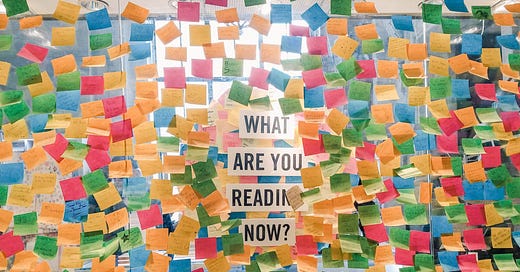I don’t know what I’m doing. A week out from The Skin and Its Girl’s birthday, all the pre-publication excitement has been expertly spun up like a mound of rainbow-colored cotton candy—mostly by others, by people who do know what they’re doing. Almost all the work happened in the last six months, and now its actual on-sale day feels, to me, more like a finish line than a launch. On April 25, the cotton candy will do what it is meant to do: vanish on a burst of sweetness.
After the first week or two in the world, a book’s life becomes human-scale again. People will read it, and I hope they’ll tell their friends about it. There will be some events, and I hope people show up and have a good time. The moment will pass unless something else happens: an award longlist, a late good review, or a late mention from a big influencer. By then, however, I’ll have gone back to doing what I do know how to do: writing, running my editing business, and balancing creativity with folding laundry. In July, I’ll start teaching courses at The Loft, which is the next new, exciting thing.
The real magic of publishing The Skin and Its Girl is twofold: first is the story magic, the making-real of characters, concepts, and feelings for people who read the novel. Second, and more corporeal, is the community of people I am building relationships with because of the book: other queer Arabs, folks at SWANA arts organizations like Mizna and the Radius of Arab American Writers, booksellers, school librarians, and writers who are, like me, trying to figure out a career of making art. I’m so much an introvert that years ago, I hung a sign by my desk that says RELATIONSHIPS just so that I don’t forget that they can be joyful. The book made these possible, or at least hastened some friendships that would have taken longer to form otherwise. Altogether, this joy is a portrait of a concept I’ve been thinking about a lot lately: literary citizenship. How it’s okay to be both a giver in some situations and a recipient in others. But what does that mean?
Do you want to live in a culture that has a thriving literary community? I do. I want to live in a world where books get discussed the way sports and Netflix series do: passionately, without snobbery, as a normal way to start a friendship. Here are seven vital ways to participate right now.
1. Talk about Books You Love
Did you love a book? Did you almost love it but Have Thoughts? Gossip can be a good thing, especially when it means that the novel you just read doesn’t get binged upon and forgotten between the couch cushions like a sad potato chip.
Social media: A word about etiquette—not all authors want to be tagged, even if you have glowing things to say. Check their feed and see if they share others’ reviews, as that can be a clue.
Reviews (informal): Five-star ratings help sell books. Not just on Amazon. If you give a star rating on Goodreads, it also shows up on Amazon—and books with fewer than five stars get penalized in the sales rankings and recs. Folks often see five-star reviews and assume they’re less trustworthy than three- and four-star ones, but what matters more to you, personally? The integrity of an algorithm or helping a real human author? If you Have Thoughts, give the book five stars and qualify your thoughts in a short, few-sentence review.
Reviews (formal): Want to really champion a book? Pitch it to the arts or books editor at your local newspaper, or try a literary magazine that publishes reviews. Read the section to get a taste of the style first. You’ll also want to pick a book you can get an advance copy of via Netgalley, Edelweiss, the publisher, or the author so that you have time to read and review it before its on-sale date.
Interview the author: This can be a formal pitch to a literary magazine or other publication that runs interviews. Maybe you have a podcast. Or you just have a Substack and a lot of subscribers. You’ll want to read the book beforehand, and it’s not weird to send questions ahead of time for live or recorded interviews.
Or just champion a book when you’re talking to your aunts or your friends or your colleagues. If you also want to buy 40,000 copies of the book and distribute them for the holidays, that’s cool too. You’ll singlehandedly make it a bestseller.
2. Buy Books from Indies, or Use the Library
No, I haven’t kicked my Amazon habit yet, either. That’s the crappy thing about exploitative convenience in a culture that monetizes time and underpays almost everyone. But when you can, make the effort to order your physical books from Bookshop.org, which offers a discount and makes sure your nearby indie gets the sale.
Or just request the book (or e-book) from your library if it’s not already in stock, and be sure to check it out when it does arrive. Usually, there’s a request page on the library website for this kind of thing. Libraries track loans, and like booksellers, librarians have a vocational love of connecting readers to books they might like.
3. Go to Readings & Events
Doesn’t it feel great when you host a party and a bunch of people show up? That’s essentially the bottom line for authors who participate in public events. Ninety-nine percent of the events I’m doing for The Skin and Its Girl, as a debut author, are uncompensated. The in-conversation partners who agreed to read my book, sit up there and ask me questions, and pretend to be an extrovert for an evening are doing it all for free, too. The bookstores might sell a dozen books, but they also do the work of publicizing and staffing the event. This is part of what literary citizenship means: taking part in an economy of generosity that has almost nothing to do with money. We all want to live in a world where people care about books, and a roomful (or a Zoomful) of book lovers is part of that vision.
And it doesn’t go without saying, “events” can also be a school board meeting. Do you live in a district or state where hateful pinheads are petitioning to ban kids’ books they haven’t even read? Or just close all the libraries? Literary citizenship, like democracy, is not a passive existence.
4. Make Connections
Share a book with a friend who will love it. Booksellers, librarians, and social media book influencers are superstars when it comes to this, but speaking just for myself, you can make my heart melt just by reading your copy of The Skin and Its Girl, handing it off to your friend, and saying, “Hey, I think you might like this too.”
Introduce people who can help each other. Thanks to the social and professional generosity of more established peers, I found my agent and found teaching opportunities—in other words, sometimes, that introduction is a career booster.
Actively invite writers into the organizations you’re a part of, even community nonprofits and schools. Whether you’re orchestrating a career day, entertaining a group of senior citizens, or engaging new members of a team, there are lots of writers who would love to visit the location, facilitate some prompts, talk about living the creative life, and more. Speaking just for myself here, those invitations feel really great, because they mean that the thing I’ve been spending my whole life doing is something other people care about doing too.
5. Create Access
If you have institutional clout, use it for good. This is just one example, but I’ve noticed a lot more literary organizations offering application fee waivers (hi, MacDowell, Hedgebrook, and Tin House residencies!) and getting rid of the recommendation letter requirement. These are major barriers to entry for new and emerging writers who aren’t newly minted from MFA programs; writers who don’t yet know famous writers and for whom five or six $45 entry fees a year is painful. But those residencies can be a huge first step in building a literary community and peer support network.
It’s also good to see diversity among the people who make decisions for prestigious opportunities like grants, fellowships, and publishing jobs. And if you coordinate opportunities of any kind for your organization, consider partnering with existing groups that are already a trusted resource among the writers or educators you’re trying to attract. Then pay well and act right.
6. Share the Love (Be a Book Auntie)
Teach, mentor, volunteer, read at story hour, start a book club, write an article about that obscure author you love, recommend or subscribe to a bookish Substack like
or , donate to a literary org, or give the kids in your life money for the school book fair. Whether you’re an introvert, extrovert, or ambivert, there are a thousand ways to pay your love of books forward. An active community benefits everyone, and it takes all kinds of forms.7. Read, Be Curious
Last and most important, don’t get so busy with everything else that you let reading with an open heart and open mind slip. Hide under a blanket with a flashlight and tell your boss to get lost. As a self-employed person, I can confirm that my boss is relentless and must be muted from time to time.
Bottom Line
It would be great to see you at one of the events, or just hear from you in the comments. Want to know more about something I said here? Just ask. I’m going to try out the chat feature and Substack Notes—more ways to connect about books, publishing, and the writing life. Here’s my first note:
Finally, just, thank you. By subscribing to this Substack, you’re already doing something I appreciate. If you’ve preordered The Skin and Its Girl, thank you (or you can just follow that link and hear a sample of the audiobook, which is so well done). For being a friend, a peer, a client, a mentor, or a supportive family member, you make it possible to write—I don’t always say it, but there are times when each and every one of my friends has propped me up or created space for me to write without their knowing it, and I would not be finally staring at my actual, literal publishing date on the calendar without you in my life.






Great ideas, Sarah! I especially like the one about giving a kid a few dollars to shop around at the school book fair. Congratulations on the coming launch of The Skin And Its Girl!
Very inspiring! I'm ordering your book and can't wait to read it. Also, I write Oenobooks on Substack where I review books (only those I like, no bad reviews!) and pair them with wine. Where and when is your book launch? I'd love to attend